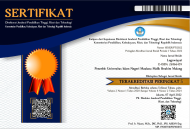ANALYSIS OF ARABIC TRANSLATION DIGITAL DICTIONARY APPLICATIONS IN THE ERA OF SOCIETY 5.0
Abstract
Full Text:
PDFReferences
Ahmed, A. M. (2019). Effects and Students’ Perspectives of Blended Learning on English/Arabic Translation. Arab Journal of Applied Linguistics, 4(1), 50–80. https://doi.org/10.1234/ajal.v4i1.175
Ahmad Arifin, Slamet Mulyani. “Persepsi Mahasiswa Terhadap Penggunaan Kamus Digital Bahasa Arab Di Era Society 5.0.” An-Nabighoh, vol. 23, no. No 2, 2021.
Andi Agussalim, Yusring Sanusi Baso, Zuhriah Universitas. “Perancangan Kamus Digital Linguistik-Arab Berbasis Windows Dan Android.” Nady Al-Adab, vol. 16, no. 2, 2019, pp. 75–87.
Azmi, Hafidz, et al. “Peran Kamus Digital Arab Bagi Mahasiswa Studi Arab Di Era 4.0.” Multaqa Nasional Bahasa Arab, vol. 1, no. 1, 2018, pp. 1–10.
Besse Wahida. “Kamus Bahasa Arab Sebagai Sumber Belajar (Kajian Terhadap Penggunaan Kamus Cetak Dan Kamus Digital).” AtTurats : Jurnal Pemikiran Pendidikan Islam, vol. 11, no. 1, 2017, pp. 58–71.
Don, K. S. (2019). BNPT Imbau Pengurus Masjid Tangkal Penyebaran Paham Radikal. Sindonews.com. https://nasional.sindonews.com/read/1383699/14/bnpt-imbau-pengurus-masjid-tangkal-penyebaran-paham-radikal-1551660263
Fadhilah, Maulida Almas. “Analisis Karakteristik Aplikasi Kamus Arab- Indonesia Karya Tim Ristek Muslim.” Alsina : Journal of Arabic Studies, vol. 3, 2021, pp. 201–18.
Fajriyah, K., Firdauziyah, A. K., Afifah, R., Setiawati, W., & Suhada’, H. (2021). Agama dan Bullying Perspektif Psikologi Agama. Al Ghazali, 4(2), Article 2. https://doi.org/10.52484/al_ghazali.v4i2.250
Hasnah Atikah, Imam Fauji. “The Use of an Android-Based Arabic Dictionary in the Arabic-Indonesian Tarjamah Course at the University.” Indonesian Journal of Islamic Studies, vol. 10, 2022.
Hastang. “Efektifitas Kamus Bahasa Arab Berbasis Aplikasi.” Didaktika Jurnal Kependidikan, vol. 11, no. 1, 2017, pp. 112–20.
Khairina Nasution, Rahlina, Rahimah. “A Dictionary Of Bilingual Morphosyntax Indonesian-Arabic: Lexicographic Studies.” Journal of Language and Linguistic Studies, vol. 4, 2021, pp. 2697–706.
Kemenkumham. (2019). Undang-Undang Republik Indonesia Nomor 10 Tahun 2019 Tentang Kepariwisataan. https://www.ekowisata.org/uploads/files/UU_10_2009.pdf
Mahmudah, L. (2015). An Analysis of Pronunciation Exercises in Duolingo Application and Its Contribution as English Learning Media [Undergraduate, UIN Walisongo]. http://eprints.walisongo.ac.id/5059/
Qubaila, Asa, et al. “Arabic-Indonesian Dictionary : Comparison of Digital Dictionary and Printed Dictionary.” Al-Ma’rifah : Jurnal Budaya, Bahasa, Dan Sastra Arab, vol. 19, no. 1, 2022, pp. 41–52, doi:10.21009/almakrifah.19.01.04.
R. Taufiqurrahman, MA. Aplikasi Kamus-Kamus Digital Dalam Penerjemahan Bahasa Arab. Universitas Islam Negeri (UIN) Maulana Malik Ibrahim Malang, 2009.
R. Taufiqurrochman, Dewi Nur Suci. Student’s Perception of E-Dictionary Arabic Indonesian in IR 4.0 Era. ICONQUHAS, 2018, pp. 1–12.
Setia, Eddy. “Terjemahan, Permasalahan, Dan Beberapa Pendekatan.” Academia, 2017.
Setiyawan, Agung. “Problematika Penggunaan Kamus Arab-Indonesia Dalam Pembelajaran.” Arabia, vol. 8, no. 1, 2016, pp. 89–118.
Siregar, Muhamad Nasrun, and Fitriani. “Problematika Terjemah Menurut Al-Jahiz.” IJAS: Indonesian Journal of Arabic Studies, vol. 1, no. 2, 2019, p. 16, doi:10.24235/ijas.v1i2.4880.
Siti Fatimah Azzahra1, Nur Hizbullah2, Iin Suryaningsih. “Penyusunan Kamus Kedokteran Arab – Indonesia Dengan Pendekatan Linguistik Korpus.” Tsaqofiya : Jurnal Pendidikan Bahasa Dan Sastra Arab, vol. 2, no. No 2, 2020, pp. 60–66.
Studi, Program, and Pendidikan Bahasa. Efektifitas Kamus Bahasa Arab Berbasis Aplikasi. pp. 112–20.
Syuhadak, S. (2022). Interview Mudir Ma’had Aly UIN Malang [Personal communication].
Taufiqurrochman, R. (2015). Kamus Kedokteran" Nuria": Indonesia-Arab, Arab-Indonesia. Ar-Ruzz Media.
Taufiqurrochman, R. (2016). Pendidikan Masyarakat Berbasis Masjid. In Santri & Kiai: Percikan Pemikiran dan Kesaksian Melepas Masa Pengabdian KH. Chamzawi (Vol. 1, pp. 254–265). Lentera Kreasindo.
Taufiqurrochman, R. “The Use of Arabic Electronic Dictionaries in The Industrial Revolution Era 4 . 0.” EasyChair Preprint, 2019.
Yuliyani, R., Rezeki, S., & Tama, B. J. (2021). Analisis Opini Guru dan Siswa di Jakarta terhadap Pembelajaran Jarak Jauh selama Pandemi Covid-19. SINASIS (Seminar Nasional Sains), 2(1), Article 1. http://proceeding.unindra.ac.id/index.php/sinasis/article/view/5362
DOI: https://doi.org/10.18860/lg.v6i1.25733
Refbacks
- There are currently no refbacks.
Indexed By ;
--------------------------------------------------------------------------------------------------------------------------------------------------------------------------------------
Program Khusus Pengembangan Bahasa Arab
Gedung C (Prof. Dr. H. Mudjia Rahardjo., M.Si.) Lt. 1
Jl. Gajayana No 50 Kota Malang, Jawa Timur, Indonesia, Kode Pos 65144,

Lugawiyyat Journal is licensed under a Creative Commons Attribution-ShareAlike 4.0 International License .






